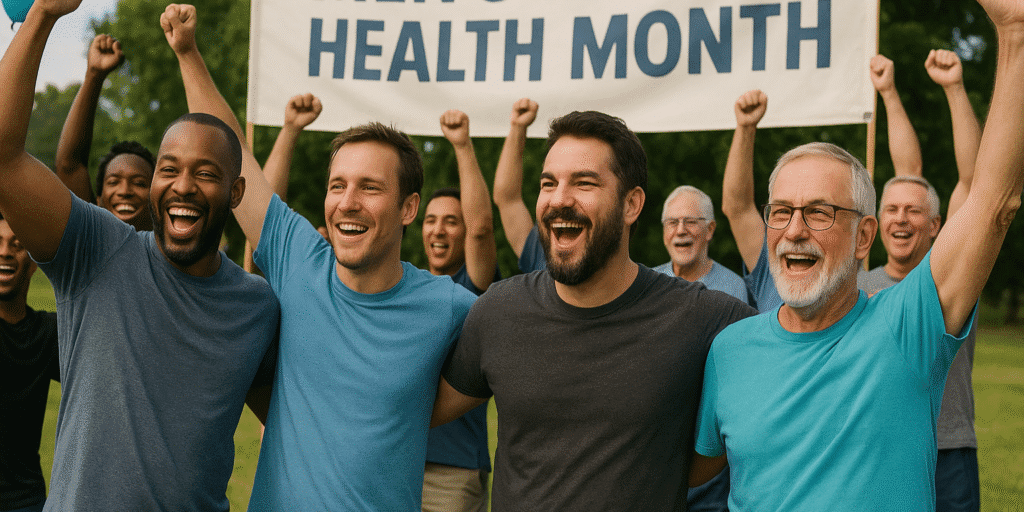Men’s Mental Health Month, celebrated globally in July, marked a significant milestone in the ongoing effort to address mental wellness for men. This month-long awareness campaign was designed to break down the stigma surrounding men’s emotional health and bring attention to the unique mental health challenges men face. With a series of seminars, workshops, and social media campaigns, Men’s Mental Health Month 2023 became a key moment in advancing the conversation on how men can better prioritize their mental health.
The impact was particularly evident in major cities like Los Angeles and New York, where public forums and charity events were held to advocate for mental health support and awareness. These events fostered an open dialogue on depression, anxiety, and the effects of societal pressures on men’s mental well-being. The theme of this year’s Men’s Mental Health Month focused on creating safe spaces for men to talk about their emotions and seek help, without the fear of judgment or stigma. These conversations are becoming crucial in reshaping how society views men’s emotional health.
Men’s Health Awareness Day: A Spotlight on Emotional Well-being
One of the major highlights of Men’s Mental Health Month in July 2023 was the “Men’s Health Awareness Day”, held in New York on July 18. This event brought together a range of athletes, mental health professionals, and community leaders, each sharing their personal stories and strategies for overcoming mental health challenges. These discussions focused on key issues that disproportionately affect men, including depression, anxiety, and the damaging effects of societal expectations surrounding masculinity.
The event emphasized how societal pressures often make it difficult for men to acknowledge their vulnerabilities and seek the help they need. A prominent theme throughout the day was the importance of creating male-specific support networks. These networks provide a sense of camaraderie and safety, encouraging men to open up about their mental health struggles. By creating spaces where men can share their experiences without fear of judgment, these initiatives aim to destigmatize mental health discussions and promote emotional well-being.
The presence of athletes at the event also underscored the shift in how public figures are increasingly willing to discuss their own mental health battles. Athletes like Michael Phelps and Kevin Love have become vocal advocates for men’s mental health, and their involvement in events like Men’s Health Awareness Day signals a broader cultural shift toward openness and vulnerability in traditionally masculine fields. Their stories offer hope and inspiration to countless men who may be struggling in silence.
Movember and #MenMatter: Campaigns Shaping the Narrative
Another significant aspect of Men’s Mental Health Month 2023 was the surge in support for advocacy campaigns like Movember and #MenMatter, which have long worked to raise awareness of mental health issues among men. These campaigns not only encourage men to take proactive steps toward their emotional health but also focus on combating the stigma that has historically surrounded men seeking help.
Movember, in particular, has become an iconic initiative that began as a fundraising campaign for men’s health, specifically targeting prostate cancer and mental health issues. Over the years, Movember has grown into a global movement, encouraging men to engage in open conversations about their mental well-being. Through the growing popularity of its campaigns, Movember has helped foster a sense of community for men who previously may have felt isolated in their struggles.
Similarly, the #MenMatter campaign, which focuses on the emotional health of men, has gained traction on social media, offering resources and support networks to men across the world. The campaign advocates for more accessible mental health services, and its success has shown that there is a deep and growing demand for mental health support that is tailored to men’s unique needs. It has become a vital tool in shifting cultural perceptions and encouraging men to prioritize their emotional well-being.
The Growing Need for Specialized Programs
Behind the scenes, mental health professionals emphasized the growing recognition of the need for specialized programs that address men’s mental health issues, which are often overlooked in traditional discussions about mental wellness. Historically, mental health services have been tailored primarily to women, leaving men’s unique struggles largely unaddressed. However, as campaigns like Men’s Mental Health Month, Movember, and #MenMatter gain momentum, there is a clear push toward developing programs that are male-centric—programs that cater to the specific ways men experience mental health challenges.
In addition to providing education and awareness, there is also a growing need for mental health services that are accessible, non-judgmental, and sensitive to men’s particular needs. Experts point out that while many men suffer from mental health conditions, they are often reluctant to seek help due to societal pressures to maintain a stoic, “tough” exterior. Therapists, support groups, and online platforms that are specifically tailored to men’s emotional needs are helping to provide more accessible care and encouraging men to be more proactive about their mental well-being.
The Impact: Shifting the Conversation on Men’s Mental Health
The impact of Men’s Mental Health Month 2023 is undeniable. As more men share their experiences and seek help, the stigma surrounding men’s mental health is slowly eroding, leading to a more supportive and inclusive environment for future generations. Men are increasingly recognizing that mental health is not a sign of weakness, but a vital aspect of overall health and well-being.
As these initiatives continue to gain momentum, we can expect to see more open conversations, accessible resources, and a healthier dialogue around masculinity and emotional health. The continued success of these movements is paving the way for a future where men can feel empowered to prioritize their mental wellness just as much as their physical health, without fear of stigma or societal judgment.
Source: Mental Health Foundation
